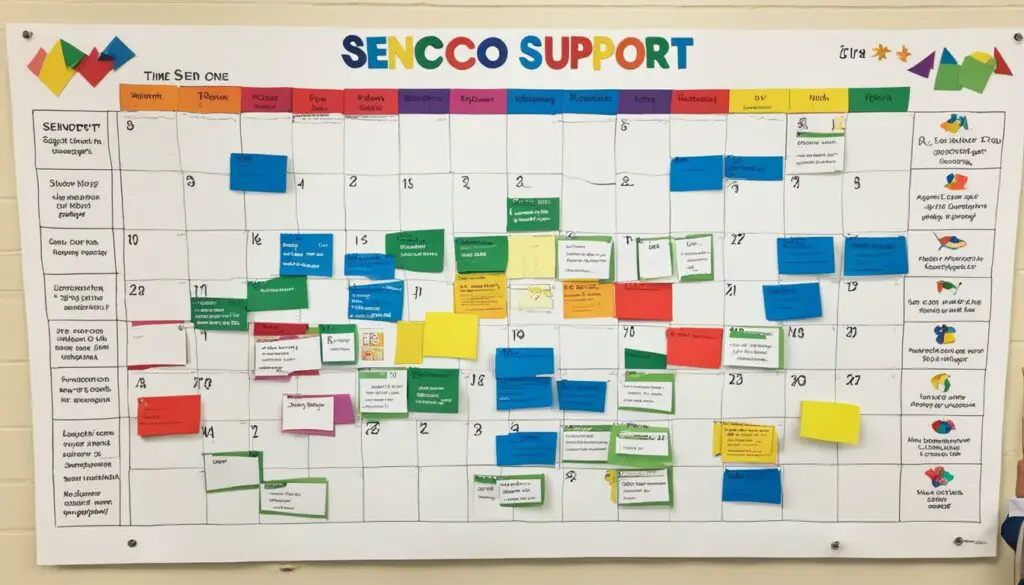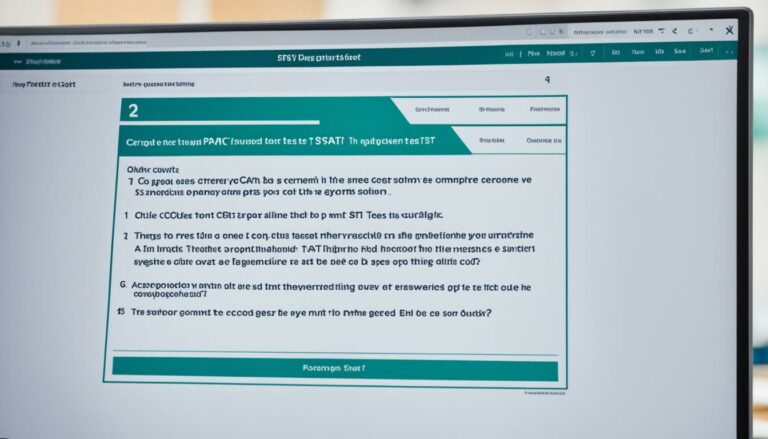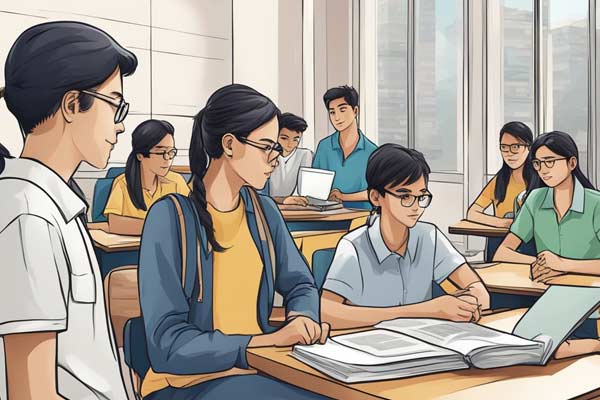SENCo Role Explained: Supporting Student Needs
A SENCo is essential for supporting special educational needs (SEN) students. They manage the school’s SEN policy, collaborate with teachers, parents, and external agencies, and ensure children with SEN receive the required support.
SENCo plays a key role in promoting effective teaching, implementing individual education plans, and fostering an inclusive learning environment for the overall well-being of students with special needs.
Introduction to the Special Educational Needs Coordinator (SENCo)
The SENCo collaborates closely with teachers, parents, and external professionals to develop individual education plans tailored to each student’s unique requirements. They are responsible for tracking student progress, monitoring the effectiveness of interventions, and making necessary adjustments to support inclusive education.
Strategic Development of SEN Policy and SENCo’s Influence
The SENCo is crucial in strategically developing the school’s SEN policy and provision. As part of the school leadership team, they collaborate with the headteacher and governing body to determine and implement effective policies and strategies to support students with special educational needs.
The SENCo’s expertise and insights are essential in integrating the SEN policy with the school’s overall development strategies, ensuring that inclusive education practices are embedded throughout the school community.
The SENCo as Part of the School Leadership Team
As a member of the school leadership team, the SENCo directly influences the school’s SEN policy and provision. They work alongside the headteacher and other senior leaders to develop a comprehensive and inclusive approach to meeting the needs of students with special educational needs.
The SENCo brings its specialized knowledge and experience to the table, advocating for the effective implementation of inclusive education strategies that support the diverse learning needs of all students.
Integrating SEN Policy with School Development Strategies
The SENCo plays a vital role in ensuring that the school’s SEN policy aligns with the school’s overall development strategies. They collaborate with the leadership team to integrate inclusive education strategies into the school’s vision, mission, and goals.
This integration ensures that inclusive education becomes a core component of the school’s identity, nurturing students’ academic, social, and emotional well-being with special educational needs.

Day-to-Day Responsibilities of a SENCo
Supporting Students and Coordinating Resources
The day-to-day responsibilities of a SENCo involve supporting students with special educational needs and coordinating the necessary resources to facilitate their learning. They work closely with teachers to identify students who may require additional assistance, whether in differentiated instruction, accommodations, or specialized support.
🌟 Hey Students! 🚀 Ready for the ultimate experience? Join us on Studentsinside.com's Facebook, YouTube, WhatsApp, and LinkedIn. Click now for tips, fun, and success vibes! 🌈✨ #StudentLife #JoinUs
The SENCo is critical in developing and implementing individual education plans (IEPs) for students with special needs. These plans outline specific goals, strategies, and interventions tailored to each student’s unique learning requirements.
Additionally, the SENCo is responsible for coordinating resources within the school to meet the diverse needs of students. This can include collaborating with other staff members to allocate assistive technology, specialized materials, and personnel expertise to support inclusive education practices.
Liaison with External Agencies and Parent Engagement
Collaboration with external agencies is a vital aspect of a SENCo’s responsibilities. The SENCo liaises with professionals such as educational psychologists, therapists, and support services to ensure that students receive the necessary interventions and accommodations to support their educational journey.
Parent engagement is integral to the success of supporting students with special educational needs. The SENCo actively engages parents and guardians in the SEN process, establishing open lines of communication and providing regular feedback on their child’s progress.
Collaborative planning and review meetings are conducted to discuss individual education plans, set goals, and address any concerns or adjustments required to ensure the best possible outcomes for the student.
Empowering SENCo Leadership: Authority and Inclusion
What Being on the Senior Leadership Team Means for SENCo
As a senior leadership team member, the SENCo plays a crucial role in shaping the school’s approach to special educational needs. Their position empowers them to contribute to decisions actively, influence the school’s direction, and advocate for inclusive education. By collaborating with senior leaders, they champion diversity, implement strategies, and ensure equal opportunities for all students.
Importance of SENCo’s Position for Effective School Change
The SENCo’s position within the senior leadership team is instrumental in driving effective school change for special educational needs provision. Their expertise and insights ensure that the unique needs of these students are at the forefront of school improvement initiatives.
The SENCo can foster a whole-school approach to inclusive education through effective collaboration with other senior leaders. This can lead to improved academic outcomes, enhanced social-emotional development, and increased overall well-being for students with special educational needs.
SENCo Leadership and Authority in the Senior Leadership Team
| SENCo Leadership in the Senior Leadership Team | Key Responsibilities |
|---|---|
| Advocacy for inclusive education | Championing the rights of students with special educational needs, promoting a diverse and inclusive learning environment. |
| Resource allocation | Participating in budgetary decisions ensures appropriate resources are allocated to support students with special needs. |
| Strategic decision-making | Collaborating with other senior leaders to develop policies, strategies, and initiatives that enhance support for special educational needs provision. |
| Collaboration with stakeholders | Work closely with teachers, parents, and external agencies to facilitate collaboration and address students’ needs. |
| Promoting a positive school culture | Fostering an inclusive and supportive learning environment where every student can thrive academically, socially, and emotionally. |
Allocating Time for SEN Support: SENCo’s Scheduling Needs
Adequate time allocation allows the SENCo to work closely with teachers, students, and external agencies to provide the necessary support and interventions. This includes developing individual education plans, conducting assessments, collaborating with teachers, and engaging with parents and guardians.
Furthermore, the SENCo’s scheduling needs involve prioritizing time for professional development and staying updated with the latest research, methods, and interventions in special education. Continuous learning and growth enable SENCo’s to enhance their knowledge and skills, ultimately benefiting the students they support.

Assessment and Individual Education Plans in SEN Provision
They work collaboratively with teachers and external professionals to conduct assessments, gather data, and develop individualized plans that address the specific learning needs of each student.
- Assessment: Through various assessment methods, including observations, standardized tests, and informal assessments, the SENCo gathers information about a student’s strengths, weaknesses, and specific learning needs. This assessment process provides a comprehensive understanding of a student’s abilities and areas requiring additional support.
- Identification of SEND Students: The SENCo uses the assessment results to identify students who require additional support due to special educational needs. This identification process ensures that students receive the necessary accommodations, interventions, and specialized instruction tailored to their requirements.
- Tracking Student Progress: Once students with SEND are identified, the SENCo tracks their progress to determine the effectiveness of the interventions and supports provided. Regular monitoring and ongoing assessment allow adjustments and modifications to individual education plans to optimize student outcomes.
To boost learning outcomes for students with special needs, it’s crucial to tailor education plans with the right accommodations, differentiated teaching, and specialized support.
These plans set clear goals and strategies, aiding teachers in adapting resources and implementing effective interventions.
This collaborative approach supports academic and personal development and creates an inclusive environment, ensuring the success of students with special needs.
Critical Areas of Focus for SENCo
Addressing Diverse Learning Challenges Within the School
One of the critical areas of focus for the SENCo is addressing diverse learning challenges within the school. This involves understanding the unique needs of individual students and developing personalized approaches to meet those needs.
The SENCo collaborates with teachers to implement differentiated instruction methods catering to different learning styles, ensuring no student is left behind.
Special Needs Resources and Expertise Available in Schools
To address diverse learning challenges effectively, the SENCo must identify and allocate special needs resources within the school. These resources include assistive technology, specialized materials, and personnel expertise. The SENCo ensures that appropriate resources are available to support students with special educational needs, enabling them to access a quality education.
Engaging Parents and Guardians in the SEN Process
Ensuring Regular Communication and Honest Feedback
The SENCo plays a pivotal role in fostering regular communication with parents, providing them with updates on their child’s progress, and offering honest feedback. This open and transparent communication lets parents stay informed about their child’s educational journey and make informed decisions regarding their support and development.
Collaborative Planning and Review Meetings with Parents
In addition to regular communication, the SENCo facilitates collaborative planning and review meetings with parents. These meetings provide an opportunity for parents to actively participate in the development and review of their child’s education plan.
Collaborative meetings also enable parents and professionals to exchange ideas, share strategies, and collectively work towards the best outcomes for the child.
In conclusion, engaging parents and guardians in the SEN process is vital for supporting students with special educational needs. Through regular communication, honest feedback, and collaborative planning and review meetings, the SENCo can establish a strong partnership with parents, ensuring that the child’s needs are understood and met effectively.
FAQ
Q: What is the role of a Special Educational Needs Coordinator (SENCo) in supporting student needs?
A: The SENCo is pivotal in supporting students with special educational needs. They oversee the school’s SEN policy and ensure that children with special educational needs receive the necessary support. They work closely with teachers, parents, and external agencies to coordinate resources and provide inclusive education.
Q: What is the purpose of a SENCo in education?
A: The SENCo, or Special Educational Needs Coordinator, is a teacher who coordinates and leads the provision for students with special educational needs in a school. Their role is to support students with diverse learning needs and ensure that they receive appropriate support and accommodations. They work closely with teachers, parents, and external professionals to develop individual education plans, track student progress, and provide inclusive education opportunities.
Q: How does the SENCo contribute to the strategic development of SEN policy and provision?
A: The SENCo is an integral part of the school leadership team and collaborates with the headteacher and governing body to develop effective policies and strategies for supporting students with special educational needs. They integrate the SEN policy with the school’s overall development strategies, ensuring that inclusive education practices are embedded throughout the school community.
Q: What are the day-to-day responsibilities of a SENCo?
A: The day-to-day responsibilities of a SENCo involve supporting students with special educational needs and coordinating necessary resources. They work closely with teachers to identify students needing additional support, develop individual education plans, and monitor student progress. The SENCo also liaises with external agencies to ensure students receive the necessary interventions and accommodations. They engage parents and guardians in the SEN process through regular communication, collaborative planning, and review meetings.
Q: How does being on the senior leadership team empower the SENCo?
A: Being a part of the senior leadership team empowers the SENCo to have the authority and influence needed to drive effective school change regarding special educational needs provision. The SENCo’s position enables them to advocate for inclusive education, allocate resources, and make strategic decisions to improve support for students with special needs.
Q: How much time is allocated for SEN support?
A: The Code of Practice highlights the importance of giving SENCos the necessary time and resources to carry out their duties effectively. The time required varies depending on the school and the number of students with special educational needs. However, it is generally agreed that anything less than a working day each week is insufficient for the SENCo to fulfill its responsibilities.
Q: What is the role of the SENCo in assessing and developing individual education plans?
A: The SENCo is crucial in identifying students with special educational needs and tracking their progress. They work collaboratively with teachers and external professionals to conduct assessments, gather data, and develop individualized plans that address the specific learning needs of each student. Effective individual education plans involve providing appropriate accommodations, differentiated instruction, and specialized support.
Q: What are the critical areas of focus for a SENCo?
A: A SENCo’s critical focus areas include addressing diverse learning challenges within the school. They work closely with teachers to ensure appropriate strategies and interventions are in place to support students with various learning difficulties. The SENCo also plays a role in identifying and allocating special needs resources within the school, such as assistive technology and specialized materials.
Q: How does the SENCo engage parents and guardians in the SEN process?
A: Engaging parents and guardians in the SEN process is essential for the success of supporting students with special educational needs. The SENCo ensures regular communication with parents, provides honest feedback, and involves them in collaborative planning and review meetings. They act as a bridge between parents, teachers, and external professionals, facilitating effective partnerships and advocating for the best interests of the students.








